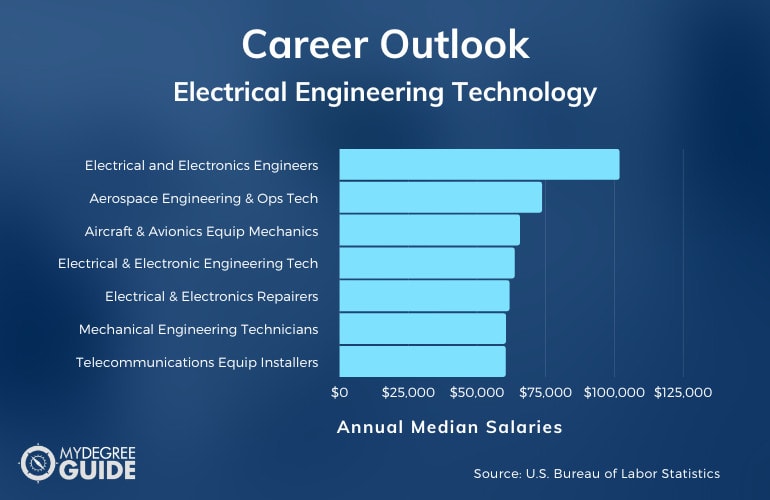An associates in electrical engineering can help you develop specialized technical skills that are essential across several industries.

Electric components and devices are everywhere, from computers and cell phones to batteries and space projects. Studying electrical engineering will familiarize you with the core workings of various devices so you can be able to install, repair, and maintain them.
Editorial Listing ShortCode:
If you love abstract thinking, figuring out how devices work, and solving science and math problems, then you might consider an associate degree in this lucrative field.
Online Associates in Electrical Engineering Degrees

An online associate degree in electrical engineering can prepare you for entry-level technician positions in manufacturing, telecommunications, semiconductors, aviation, and many other fields.
Electrical engineering focuses on electric systems, including generators, motors, navigation systems, computer hardware, and sensors. Since so many of the devices we use today depend on electric circuits, an electric engineering associate degree could lead to a wide range of career options.
An associate degree typically takes 2 years to finish with full-time study, and you can learn practical skills that you can directly apply to the workplace. An electric engineering associate degree can train you in the fundamentals of designing, installing, maintaining, and troubleshooting electric systems.
Here are some skills that are covered in an electrical engineering associate degree:
- Interpreting various types of engineering diagrams and electrical plans
- Analyzing, putting together, and understanding the components of various circuits
- Understanding the workings of both analog and digital electronics and larger machines
- Using programming languages to program microcontrollers
- Expressing technical information clearly through reports and presentations
An electrical engineering associate program starts with coursework on foundational subjects, such as physics, calculus, and chemistry. You’ll then take core engineering classes that tackle topics like electronic circuits, electrical drawing, and digital systems.
Editorial Listing ShortCode:
Classes are very hands-on, and lectures are paired with laboratory activities where you can have the chance to work directly with electronic components. Graduates with this associate degree can venture into several industries that use electrical systems. Common entry-level roles include electrical technician, mechanical technician, test technician, and drafter.
Graduates may also go on to pursue a bachelors degree, getting their associate degree classes credited to lessen the remaining classes they have to take.
Electrical Engineering Technology Careers & Salaries

An associate’s in electrical engineering is intensely focused on teaching you practical skills that are relevant to a technician job. As a result, graduates can usually take on entry-level technician jobs in various industries that use electrical equipment.
Technicians can have different specializations, but their day-to-day tasks mostly involve installing, maintaining, and troubleshooting electrical equipment. Electrical engineering technicians can be found in any field where electrical equipment is used regularly, including telecommunications, aviation, robotics, manufacturing, medical technology, and computer hardware.
According to the Bureau of Labor Statistics, here are the median salaries of positions related to electrical engineering.
| Careers | Annual Median Salaries |
| Electrical and Electronics Engineers | $101,780 |
| Aerospace Engineering and Operations Technologists and Technicians | $73,580 |
| Aircraft and Avionics Equipment Mechanics and Technicians | $65,550 |
| Electrical and Electronic Engineering Technologists and Technicians | $63,640 |
| Electrical and Electronics Installers and Repairers | $61,760 |
| Mechanical Engineering Technologists and Technicians | $60,460 |
| Telecommunications Equipment Installers and Repairers | $60,370 |
| Electro-Mechanical and Mechatronics Technologists and Technicians | $60,360 |
| Drafters | $60,290 |
| Industrial Engineering Technologists and Technicians | $60,220 |
Engineering technicians may conduct regular inspections, install new circuits based on engineering designs, and perform quality control on electrical devices.
Some technicians work with engineers and scientists who create new products, so they may assist with data gathering and product testing in laboratories. There are also technician roles that require more customer interaction. For example, field service technicians might have to teach customers how to use specific equipment.
Editorial Listing ShortCode:
Aerospace engineering technicians tend to have some of the highest median salaries, and aircraft mechanics and technicians are highly sought after. Aircraft and avionics are likely to be one of the more lucrative specializations for technicians.
Many graduates start with an associate electrical engineering degree and then go on to earn a full bachelor’s so they can work toward becoming licensed electrical engineers.
Associate’s in Electrical Engineering Curriculum & Courses

Here’s a sampling of some classes that you’ll likely take during a 2 year electrical engineering degree program:
- Principles of Electronics: This course gives an overview of how electronic circuits work along with their components, and it covers topics like Ohm’s law, semiconductors, diodes, and transistors.
- Introduction to Programming: You’ll examine programming concepts and algorithm design from the perspective of an engineer, and you’ll also study the software development life cycle.
- Programmable Logic Controllers: Programmable logic controllers (PLCs) are digital computers that are crucial in manufacturing, so you’ll learn how to design the software and hardware for these.
- Electrical Drawing: You’ll practice creating technical drawings of electrical systems—such as wiring diagrams, ladder diagrams, and rising diagrams—using industry-grade software.
- Electric Machines: You’ll examine the operations of several types of electrical machines—such as transformers, generators, and motors—along with how to set them up and maintain them.
- Electronic Circuits: This course dives deeper into circuit design and analysis methods, such as the node method, Laplace transform, and small signal analysis.
- Technical Writing: This course trains you in how to write effective engineering reports, with an emphasis on presenting data accurately and keeping documentation updated.
- Digital Electronics: You’ll study digital logic using Boolean algebra and various number systems, and you’ll apply these to working with logic circuits like flip-flops and shift registers.
- Calculus and Analytical Geometry: Most electrical engineering associate programs feature at least two calculus classes so that you’ll be able to create mathematical models for real-life engineering problems.
- University Physics: This physics course is adapted for electrical engineering, so it focuses on kinematics, energy, electromagnetism, waves, and vibrations.
Most of these courses feature plenty of laboratory exercises alongside lectures.
Admissions Requirements

You’ll usually be required to submit the following when applying for an electrical engineering technology associate’s degree online:
- High school diploma. This is the main requirement for all associate programs.
- Minimum GPA. Most programs will look for a minimum high school GPA. Alternatively, they may require you to take placement tests, depending on your GPA.
- Good math and science grades. Some electrical engineering associate programs will want to see that you did well in these related subjects.
Associate programs tend to be less strict with admission requirements, so the application process is generally faster as well.
Accreditation

When you’re searching for an online associates degree in electrical engineering, it’s beneficial to only consider regionally accredited schools.
If a school is regionally accredited, it means that it has been reviewed by external organizations and deemed to provide quality education and services. To learn more about the accreditation process, you can visit the US Department of Education’s website.
Editorial Listing ShortCode:
Attending an accredited school comes with additional benefits. For example, it’s more likely that you’ll be able to transfer credits into a bachelors program in the future. It’s also necessary to attend an accredited institution in order to receive federal aid. Many employers also regard associate degrees from accredited schools more highly.
Financial Aid and Scholarships

Financial aid can help qualifying students fund their associate degree. For federal student aid, there are many kinds of programs available, including loans and grants. You can submit the Free Application for Federal Student Aid (FAFSA) to apply for need-based aid. The federal government also offers work-study programs.
Another option is to apply for state financial aid, which tends to be need-based as well. You can also explore scholarship opportunities. These can be very competitive, and they’re usually based on your GPA, previous achievements, and field of study. Schools often have their own scholarships, and you might even find scholarships for electrical engineering students specifically.
If you’re currently working in a field that’s related to your degree, you may be able to benefit from employer tuition assistance.
Is Electrical Engineering for Me?

Electrical engineering might be a good fit for you if you relate with these points:
- Enjoy math and science. Electrical engineering programs feature a heavy amount of math and science.
- Fascinated with electronics. You’ll be spending most of your time studying the workings, components, and science behind electronics.
- Like working with your hands. Aside from theory, you may be putting together physical components and tinkering with devices.
- Interested in technician jobs. An electrical engineering associate degree can help prepare you to work as an entry-level technician.
An electrical engineer associate degree can also act as a stepping stone toward further education in the field.
What Can I Do with an Associate Degree in Electrical Engineering?

An associate degree in electrical engineering trains you directly for the workforce, with most graduates pursuing jobs as technologists or technicians across multiple industries. As a technician, you might help design, install, or repair different electrical devices. Technicians may also assist engineers in research and product development, with additional tasks like helping with instrument calibration.
Common entry-level roles include electrical tester, electrical technician, instrumentation technician, and assembly equipment technician. After gaining experience, you can pursue more management-oriented positions or even get your associate courses credited toward a bachelor’s degree.
Is Electrical Engineering Hard?

Electrical engineering is often considered a challenging field, but this can also be subjective to the individual. Some electrical engineering programs require higher GPAs for admissions compared to other fields.
Taking up electrical engineering requires a strong grasp of math, physics, and science. Electrical engineering students study calculus along with topics like signal processing. They also explore how different electrical components interact to form circuits.
This field can also require a lot of visualization and abstract problem-solving because you won’t always directly see what you’re working with, such as with waves or electromagnetism.
How Long Does It Take to Get an Online Electrical Engineering Associate’s Degree?

An associate in electrical engineering online degree usually has a minimum of 60 credits. If you study full-time, it’ll typically take 2 years to finish.
Editorial Listing ShortCode:
For online programs, though, you’ll likely find more flexible pacing options. For example, some online electrical engineering degree programs follow 8 week semesters. If you opt for an accelerated track and take classes all year round, you might be done in less time. On the other hand, students who study part-time can extend their studies to fit their schedules.
What’s the Difference Between a Mechanical vs. Electrical Engineering Associate Degree?
Associates degrees in mechanical engineering and electrical engineering consist of different topics.
| Mechanical Engineering | Electrical Engineering |
|
|
Both degrees have many overlapping subjects, such as physics and calculus.
Is an Associate Degree in Electrical Engineering Worth It?

Yes, an associate degree in electrical engineering is worth it for many professionals. Working with electrical devices requires specialized skills, so an associate degree is typically the minimum requirement for technicians.
Even with only 2 years of full-time study, an associate in electrical engineering can lead to some entry-level roles that pay above average salaries. You could potentially enter a variety of fields, such as manufacturing, research, and healthcare.
Editorial Listing ShortCode:
The Bureau of Labor Statistics estimates 6% job growth for architecture and engineering occupations and 7% job growth for installation, maintenance, and repair positions over the next ten years.
Universities Offering Online Associates in Electrical Engineering Degree Program
Methodology: The following school list is in alphabetical order. To be included, a college or university must be regionally accredited and offer degree programs online or in a hybrid format.

East Coast Polytechnic Institute offers an Associate of Applied Science in Electronics Engineering Technology that can be earned online or in-person at several campuses. The curriculum is designed to help students develop expertise in computer hardware, network fundamentals, data acquisition and control systems, and analog and digital electronics. The program can potentially be completed in just 1.5 years.
ECPI University is accredited by the Southern Association of Colleges and Schools Commission on Colleges.

Eastern New Mexico University offers an Associate of Science in Electronics Engineering Technology. It is designed to prepare students for entry-level employment or continued education at the university level. Though the degree can be completed fully online, students are still given access to comprehensive learning resources. The program offers tutoring, advising, online databases and journals, and teaching assistants.
Eastern New Mexico University is accredited by the Higher Learning Commission.

Hillsborough Community College offers an Associate of Science in Electronics Engineering Technology. The program aims to prepare students for roles where they will work as technicians performing maintenance, testing, and assisting engineers in design and development. The curriculum consists of 68 credit hours and covers concepts like circuit analysis, robotics, lasers, and computer drafting.
Hillsborough Community College is accredited by the Southern Association of Colleges and Schools Commission on Colleges.

Indiana Tech offers an Associate of Science in Electrical Engineering Technology. The program is designed for students interested in pursuing electrical, electronic, or engineering technician work. The curriculum emphasizes both technical and communication skills. All coursework can be completed fully online, including lectures and laboratory requirements.
Indiana Tech is accredited by the Higher Learning Commission.

The Associate of Science in Electrical Engineering at Lone Star College is designed to be a stepping-stone toward a bachelor’s degree in engineering. This 2 year program consists of 60 total credits and is offered at several campuses in-person as well as fully online.
Lone Star College is accredited by the Southern Association of Colleges and Schools Commission on Colleges.

Madison Area Technical College offers an Associate in Electrical Engineering Technology. The curriculum is designed to strengthen students’ core math and analytical skills and help them gain hands-on experience with multiple technologies. With a full-time course load, students can usually finish this program’s 64 credit hours in just 2 years. The program can be completed in a hybrid in-person and online format.
Madison Area Technical College is accredited by the Higher Learning Commission.

The Associate of Applied Science in Electrical Engineering at Midlands Technical College is intended as the first step toward a bachelor’s degree in the discipline. The university utilizes a variety of delivery methods including synchronous and asynchronous online classes, in-person classes, and hybrid class formats.
Midlands Technical College is accredited by the Southern Association of Colleges and Schools Commission on Colleges.

Pittsburgh Technical College offers an Associate in Electronics Engineering Technology. The program is designed to prepare students to meet the ever-increasing demands for skilled technicians in the field of electronics engineering. The program culminates in an internship, which gives students real-world experience before entering the industry after graduation.
Pittsburgh Technical College is accredited by the Middle States Commission on Higher Education.

Seminole State College of Florida offers an Associate in Arts in Electrical Engineering. The 60 credit program boasts small class sizes, online learning options, and more than 100 transfer pathways for students intending to pursue a bachelor’s degree in engineering. The curriculum aims to help students gain theoretical knowledge and hands-on experience.
Seminole State College is accredited by the Southern Association of Colleges and Schools Commission on Colleges.

The Associate of Science in Electrical Engineering Technology program at South College emphasizes the importance of critical thinking, analytical, and problem-solving skills. The curriculum includes studies in digital electronics, industrial safety, quality assurance, computer aided-drafting, circuits, and programmable logic controllers.
South College is accredited by the Southern Association of Colleges and Schools Commission on Colleges.

South Seattle College offers an Associate in Computer and Electrical Engineering. The program is designed for individuals interested in working as system analysts or software and computer engineers. Students can usually complete the program in 3 years. Graduates may pursue entry-level positions or transfer into most 4 year colleges or universities at the junior level.
South Seattle College is accredited by the Northwest Commission on Colleges and Universities.

Southern Maine Community College offers an Associate in Electrical Engineering Technologies. The program requires the completion of 66 credit hours and can typically be completed in 4 semesters of full-time study. The degree can be earned online or at South Portland or Brunswick campuses.
Southern Maine Community College is accredited by the New England Commission of Higher Education.

Thomas Edison State University offers an Associate of Science in Electronics Engineering Technology. The program is designed for students currently employed in a variety of roles within the electronics industry. The core curriculum, which makes up 21 of the program’s 60 credits, covers topics like AC and DC circuits, digital electronics, microprocessors, and solid-state devices.
Thomas Edison State University is accredited by the Middle States Commission on Higher Education.

The University of Massachusetts—Lowell offers an Associate of Science in Electronic Engineering Technology. It is designed for students interested in entering or advancing in existing careers within the electronics industry. The program consists of 66 total credits and is offered in a hybrid on-campus and online format.
The University of Massachusetts Lowell is accredited by the New England Commission of Higher Education.

The Associate of Applied Science in Electronic Technology program at the University of St. Thomas combines the convenience of online learning with the speed of a 2 year program. Courses cover topics like AC and DC circuits, digital signals, structure and function of electronic devices, hardware, software, microcontrollers, PLC systems, and computer maintenance.
The University of St. Thomas is accredited by the Higher Learning Commission.
Getting Your Electrical Engineering Associate Degree Online

An associate degree in electrical engineering can help you develop hands-on skills for working with electrical components and wiring. These versatile skill sets can be applied to many essential devices, such as lighting systems, car engines, and gas turbines.
It’s a practical degree that fits well with many industries, and you can learn how to apply basic science and engineering principles to developing electrical equipment. There are many accredited schools that also offer options for earning your degree online.
An associate degree in electrical engineering could be your first step toward a career in this innovative, wide-ranging field. Why not start exploring available online engineering degree program options today?

